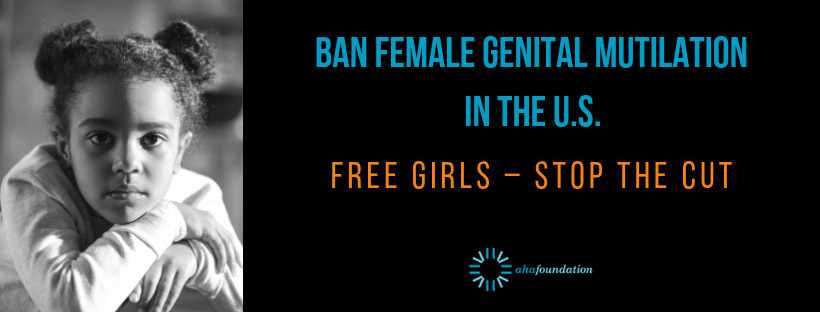Take Action: Demand Zero Tolerance for Female Genital Mutilation in the U.S.

Last updated 1/31/2024
Take Action: Demand Zero Tolerance for Female Genital Mutilation in the U.S.
Although female genital mutilation (FGM) is internationally recognized as a human rights violation, 9 states plus the District of Columbia still do not have laws protecting girls specifically from this harmful practice. These states are at risk of becoming trafficking destinations for FGM, notwithstanding a recently strengthened federal FGM ban.
The best way to ensure the safety of women and girls is to supplement the federal ban with comprehensive state legislation.
We are calling on our supporters in these remaining states to demand that their legislators prioritize women and girls in their state by banning this practice. Legislators tell us that hearing from their constituents matters. They want to hear from you!
Look below to see if your state lacks an anti-FGM law, and why efforts to ban FGM there have not yet succeeded. If you live in a state which has not yet taken action against FGM, you can also find your legislators below. We have also provided sample letters to send to your legislators calling upon them to end FGM in their state.
There must be ZERO TOLERANCE for FGM in the U.S.
Take five minutes and speak up for the girls who are voiceless.
Alabama has failed to institute state-level protections for girls. In the recent past, attempts to ban FGM have died in the Senate. In Alabama, our estimates show 1,826 women and girls are impacted by FGM. Over 39,000 women and girls are estimated to be impacted by FGM in neighboring states, meaning Alabama risks becoming a destination state for FGM.
Contact your state senator today!
Sample letter: Ban Female Genital Mutilation in Alabama
An anti-FGM bill was introduced in 2018 but it failed to move forward in the legislative process. Increased awareness among state legislators about the dangers and prevalence of this practice can spur support for an FGM ban in the state.
Sample letter: Ban Female Genital Mutilation in Alaska
Multiple anti-FGM bills have been introduced in the state of Connecticut over the past several years. The longer Connecticut waits to pass anti-FGM legislation, the more vulnerable it is to becoming a destination state for cutting. The neighboring states of New York, Rhode Island, and New Jersey collectively have 82,195 women and girls potentially impacted by FGM, 28,072 of whom are minors, and each has already passed anti-FGM legislation
Sample letter: Ban Female Genital Mutilation in Connecticut
Multiple anti-FGM laws have been introduced in Hawaii, all making little to no progress in either chamber. The number of girls at risk in Hawaii is unknown, but even one case of FGM is too many. States lacking laws also become destinations for vacation cutting and leave every single girl at risk.
Sample letter: Ban Female Genital Mutilation in Hawaii
Multiple attempts to ban FGM in Maine failed in 2018. Since 2019, no bills have been introduced. Maine is one of the few Northeastern states that fail at protecting over 150,000 girls in the region at risk. If Maine continues to lag behind in passing an FGM ban, it runs the risk of becoming a destination state for vacation cutting.
Sample letter: Ban Female Genital Mutilation in Maine
Mississippi is one of three Southeastern states to have failed women and girls by not instituting specific legislation against FGM. Over 10,000 women and girls are estimated to be at risk in the neighboring states of Tennessee, Louisiana, and Arkansas, all of which have FGM bans. One bill was introduced last year but died quickly in committee.
Sample letter: Ban Female Genital Mutilation in Mississippi
Montana is one of a few Western states that have failed women and girls in instituting an FGM ban. The state has shown no apparent interest in banning FGM in the past, but we are hopeful that increased awareness of FGM and the dangers of becoming a destination state could lead to the introduction of FGM legislation in an upcoming session.
Sample letter: Ban Female Genital Mutilation in Montana
Nebraska is one of two Midwestern states that have yet to outlaw FGM. The neighboring states of South Dakota, Iowa, Missouri, Kansas, and Colorado have an estimated 22,000 women and girls impacted by FGM, and all have FGM bans. This means girls from these states are at risk of being trafficked to Nebraska to undergo FGM. No attempts have ever been made to criminalize FGM in Nebraska.
Sample letter: Ban Female Genital Mutilation in Nebraska
New Mexico is the only state in the Southwest that has yet to specifically ban FGM. The number of minors impacted by FGM, including girls at risk of being trafficked to New Mexico from neighboring states, is estimated to be over 52,000. All of New Mexico’s neighbors have enacted anti-FGM laws, which means it is now more vulnerable than ever to becoming a destination state for those who wish to cut their girls.
Sample letter: Ban Female Genital Mutilation in New Mexico
Legislation to ban FGM in D.C. has been introduced each session since 2019. Currently, anti-FGM legislation is pending. AHA Foundation is currently working with policymakers in the capital to encourage support and progress for this proposed bill.
Sample letter: Ban Female Genital Mutilation in D.C.
Unless otherwise specified, the numbers of girls at-risk in each state have been calculated by the Population Reference Bureau. However, based on their methodology, we believe these numbers underestimate the true number of girls at risk, and believe that the actual number is much higher. Please reach out to your legislators if you live in one of these areas, and help garner support.
To truly protect the rights of every woman and girl in the U.S., we must fight for an anti-FGM law in every state.

